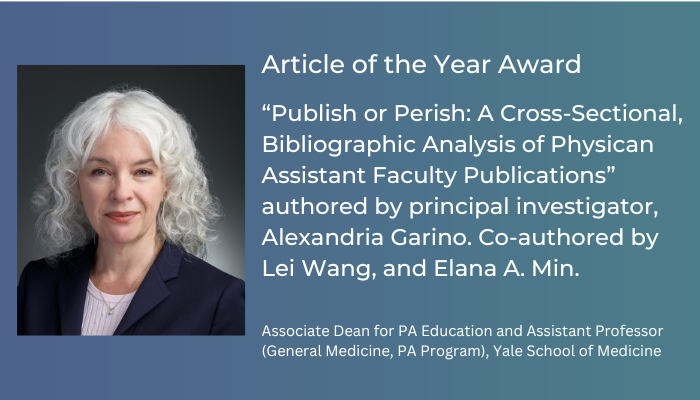The nomination cycle for this award will open in March 2024.
Award Information
This award recognizes a single peer-reviewed publication related to the training and educational direction of future generations of PAs. The primary author of the article must be a PA, a PA educator, or someone directly involved in PA education.
Criteria
Articles will be evaluated in all four of the following areas and must demonstrate substantial contributions to PA education in a minimum of two of the following areas:
- Extent of impact on the PA profession (local, regional, national, global)
- Implications for PA education, which may include interdisciplinary training and education of the PA student, admissions processes, or workforce concerns
- Contribution of new knowledge to PA education
- Potential applicability beyond the PA profession
Requirements and materials
Nomination Letter
Nomination letter describing in detail and elaborating on how each of the award criteria were met
Copy of the Recent Article
A full PDF copy of the nominated article, which must have been published between January 2021-February 2023.
Submission Limit
Only two submissions are allowed per nominator.
Employment Status
Employed at least half-time at the time of nomination (0.5 FTE) at a PAEA member program and for a minimum of three cumulative years in PA education. All years do not have to be at the same program.
Recognition
- Personalized award
- Check for $500
- Recognition at the Awards Ceremony
- Complimentary 2022 PAEA Education Forum registration
2023 Recipient

- 2022 – “Maximizing Black applicant matriculation in U.S. PA programs: associations between the number of submitted applications and likelihood of matriculation,” authored by principal investigator Trenton Honda
- 2021 – “Scholarly Productivity and Occupational Stress Among Physician Assistant Educators,” authored by Theresa E. Hegmann, Director of Curriculum and Evaluation at the University of Iowa Carver College of Medicine Department of Physician Assistant Studies
- 2020 – “Impact of Physicians, Nurse Practitioners, and Physician Assistants on Utilization and Costs for Complex Patients,” authored by Perri Morgan and colleagues, published in Health Affairs – Perri Morgan, PhD, MEd, PA-C, Duke University School of Medicine
- 2019 – “Intermediate Diabetes Outcomes in Patients Managed by Physicians, Nurse Practitioners, or Physician Assistants: A Cohort Study” by George Jackson
- 2018 – “Health Care Resource Utilization for Outpatient Cardiovascular Disease and Diabetes Care Delivery Among Advanced Practice Providers and Physician Providers in Primary Care,” Salim Virani
- 2017 – “Determinants of the Sustained Employment of Physician Assistants in Hospitals,” Marijke Timmermans
- 2016 – “Nurse Practitioners, Physician Assistants, and Physicians in Community Health Centers, 2006–2010,” Perri Morgan; Christine Everett; Esther Hing
- 2015 – “Development and Initial Validation of a Measure of Intention to Stay in Academia for Physician Assistant Faculty,” Karen Graham; Svetlana Beltyukova
- 2014 – “Physician Assistants and Nurse Practitioners Perform Effective Roles on Teams Caring for Medicare Patients with Diabetes,” Christine Everett; Carolyn Thorpe; Mari Palta; Pascale Carayon; Christie Bartels; Maureen Smith
- 2013 – “Physician Assistants and Their Intent to Retire,” Jennifer Coombs; Roderick Hooker; Kim Brunisholz
- 2012 – “The Effect of Early Geriatric Exposure upon Career Development and Subspecialty Selection Among Physician Assistant Students,” Lori Swanchak
- 2011 – “Physician Assistants—One Less Doctor(ate) in the House,” Bettie Coplan; James Meyer